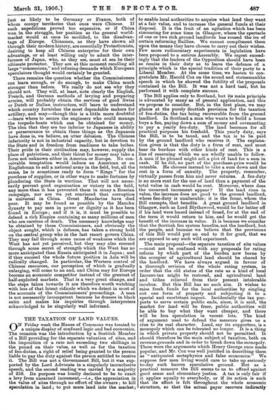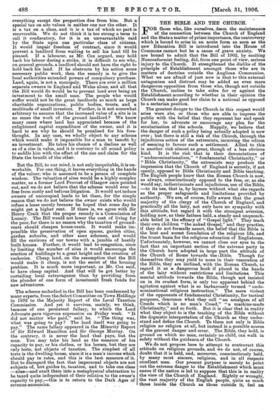THE TAXATION OF LAND VALUES.
ON Friday week the House of Commons was treated to a unique display of confused logic and bad economics. The occasion was the introduction by a Scottish Member of a Bill providing for the separate valuation of sites, and the imposition of a rate not exceeding two shillings in the pound on their value, as well as for the taxation of feu-duties, a right of relief being granted to the person liable to pay the duty against the person entitled to receive it. The Bill was not a Government Bill, but it was sup- ported by the Lord Advocate in a singularly inconclusive speech, and the second reading was carried by a majority of 258. Its purpose was loudly declared to be to exact a levy from unearned increment—i.e., the appreciation in the value of sites through no effort of the owners ; to kill speculation in land ; to put more land into the market; to enable local authorities to acquire what land they want at a fair value, and to increase the general funds at their disposal. It is the fruit of an agitation which has been simmering for some time in Glasgow, where the spectacle of one or two rich ground landlords has roused the ire of certain reforming Baillies. We cannot compliment them upon the means they have chosen to carry out their wishes. Few more rudimentary experiments in legislation have been proposed to a serious Assembly. We regret exceed- ingly that the leaders of the Opposition should have been so remiss in their duty as to leave the defence of a principle which is the special tradition of their party to a Liberal Member. At the same time, we hasten to con- gratulate Mr. Harold Cox on the sound and statesmanlike speech in which he showed the futility of the proposals contained in the Bill. It was not a hard task, but he performed it with complete success.
The Bill applies only to Scotland, but its main principle is advocated by many as of general application, and this we propose to consider. But, in the first place, we may glance at the purely Scottish provision for the taxation of feu-duties, the tax being recoverable from the ground landlord. In Scotland a man who wants to build a house buys a feu, paying down a sum of money and covenanting to pay a yearly feu-duty. The land becomes for all practical purposes his freehold. This yearly duty, says the Bill, is to be taxed, and the tax is to be paid by the ground landlord who receives it. The explana- tion given is that the duty is a form of rent, and must bear its burdens with other kinds of rent. This is a line of reasoning which we are wholly unable to follow. A man if he pleased might sell a plot of land for a sum in cash. If he did, no part of the purchase-price would be rateable. He chooses instead to take a sum down and the rest in a form of annuity. The property, remember, virtually passes from him and never returns. A feu-duty is no more rent for the use of land than a payment of the total value in cash would be rent. Moreover, where does the unearned increment appear ? If the land rises in value, the increase does no good to the ground landlord, whose feu-duty is unalterable; it is the feuar, whom the Bill exempts, that benefits. A great ground landlord in Glasgow, such as Lord Blythswood, would be far better off if his land were leased instead of feued, for at the end of the term it would return to him, and he would get the benefit of the increase in value. It is because we consider that the Scottish feu system benefits, not the landlord, but the people, and because we believe that the provisions of this Bill would put an end to it for good, that we are opposed to any such wild experiment.
The main proposal—the separate taxation of site values —must not be confused with any proposals for rating reform by which part of the burden now borne by the occupier of agricultural land should be shared by the landlord. We have always argued in favour of a thorough revision of the whole rating system, in order that the old status of the rate as a kind of local Income-tax might be restored, and, agricultural land and tithes relieved from their present intolerable incubus. But this Bill has no such aim. It wishes to raise fresh funds for the local authorities by singling out one form of property and subjecting it to a special and exorbitant impost. Incidentally the tax pur- ports to serve certain public ends, since, it is said, the market for land will be freer, public authorities will be able to buy what they want cheaper, and there will be less speculation in vacant lots. The kind of argument used to defend the measure gives us a clue to its real character. Land, say its supporters, is a monopoly which can be tolerated no longer. It is a thing in which private property should not be permitted. It should therefore be the main subject of taxation, both on revenue grounds and in order to break down the monopoly. These were the arguments which Henry George once made popular, and Mr. Cox was well justified in describing them as "antiquated metaphysics and false economics." We suppose few men living would care to take up seriously to-day such barren speculative ground. But as a practical measure the Bill seems to us to offend against good sense and elementary justice. A tax is only fair if it applies equally to everybody, or if its action is such that its effect is felt throughout the whole economic structure, so that the actual payer recovers indirectly everything except the proportion due from him. But a' special tax on site values is neither one nor the other. It is a tax on a class, and it is a tax of which no part is recoverable. We do not think it is too strong a term to call it confiscatory, for it is an unwarrantable raid by the State upon one particular class of citizens. It would impair freedom of contract, since it would prevent a landlord from waiting to sell his land till he pleased. If a labourer, as Mr. Cox argued, may hold back his labour during a strike, it is difficult to see why, on general grounds, a landlord should not have the right to hold back his land. If he obstructs by his action some necessary public work, then the remedy is to give the local authorities extended powers of compulsory purchase. Land, again, is not a monopoly. There are over a million separate owners in England and Wales alone, and all that the Bill would do would be to prevent land ever being an investment to the small man. The people who would suffer would not be the great landlords BO much as large charitable organisations, public bodies, trusts, and a multitude of small investors. Further, is it not somewhat arbitrary to assume that the increased value of a site is in no sense the work of the ground landlord ? We know many cases where land has appreciated because of the enlightened capital expenditure of the owner, and it is hard to see why he should be penalised for his fore- thought. In any case, we wholly object to any scheme which would make it impossible for a man to benefit by an investment. He takes his chance of a decline as well as of a rise in value, and it is contrary to all sound policy to saddle him with the effect of the one and claim for the State the benefit of the other.
But the Bill, to our mind, is not only inequitable, it is un- workable. For one thing, it leaves everything in the hands of the valuer; who is assumed to be a person of complete wisdom. The valuation of sites would be a highly complex matter, as a former Lord Provost of Glasgow once pointed out, and we do not believe that the scheme would ever be free from costly and tedious litigation. It would not induce owners of unoccupied lands to let them, for the simple reason that we do not believe the owner exists who would refuse a lease merely because he hoped that some day he might get a higher rent. If there is, we agree with Sir Henry Craik that the proper remedy is a Commission of Lunacy. The Bill would not lower the cost of living for the poor, for there is no reason why the taxation of ground- rents should cheapen house-rents. It would make im- possible the preservation of open spaces, garden cities, garden suburbs, and other sane schemes, and would fill the environs of our towns with a jumble of hastily built houses. Further, it would lead to congestion, since by limiting the number of sites it would encourage the erection of buildings to a great height and the creation of rookeries. Cheap land, on the assumption that the Bill would make it cheap, is not the secret of the housing problem. It is much more important, as Mr. Cox said, to have cheap capital. And that will be got better by curtailing local extravagance than by providing from the plunder of one form of investment fresh funds for new adventures.
The scheme embodied in the Bill has been condemned by many experts, from the Select Committee on Town Holdings in 1.892 to the Majority Report of the Local Taxation Commission. And yet it survives, mainly, we think, because of one persistent fallacy, to which the Lord Advocate gave vigorous expression on Friday week. "It did not matter who paid," said he. "The thing was, what was going to pay ? The land itself was going to pay." The same fallacy appeared in the Minority Report of Sir Edward Hamilton and Sir George Murray. On the contrary, it is never the land that pays, but the man. You may take his land as the measure of his capacity to pay, or his clothes, or his horses, but they are only tests, not objects of taxation. The simplest of all tests is the dwelling-house, since it is a man's income which should pay in rates, and this is the best measure of it. But to disregard the fact that impersonal objects are not subjects of, but guides to, taxation, and to take one class —sites—and exalt them into a metaphysical abstraction to be taxed quite independent of their relation to the owner's capacity to pay,—this is to return to the Dark Ages of revenue-economics.











































 Previous page
Previous page